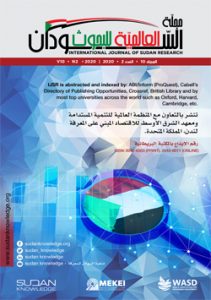The Role of Renewable Energy in Sudan’s Reconstruction: The Path to Sustainable Development, Dr Hisham Shazali, Dr Izzet Almubarak, Dr Nadir Yousif

 Dr Hisham Salaheldin Shazali
Dr Hisham Salaheldin Shazali
Institute of Environmental Studies
University of Khartoum
Khartoum
Sudan
ORCID: 0009-0004-0329-8890
 Dr Izzet A. Almubarak
Dr Izzet A. Almubarak
Faculty of Engineering, University of Khartoum
Khartoum
Sudan
ORCID: 0009-0000-4204-3322
 Dr Nadir N. M. Hassanein Yousif
Dr Nadir N. M. Hassanein Yousif
Managing Director, University of Khartoum Consulting Corporations (UKCC)
Associate Professor Civil Engineering Department
University of Khartoum
Khartoum
Sudan
ORCID: 0009-0001-1200-1532
Paper Type: Research
Received: 28 May 2025 / Revised: 14 August 2025 / Accepted: 15 August 2025 / Published: 20 August 2025
DOI: 10.47556/J.IJSR.13.1-2.2026.1
Purpose: This article explores the role of renewable energy, particularly solar power, in addressing Sudan’s energy crisis in the context of post-war reconstruction and long-term sustainable development.
Design/Methodology/Approach: A qualitative approach will be used, analysing policy frameworks, technological advancements, and case studies in the fields of solar, wind, hydropower, and biomass energy. The research also evaluates the challenges and opportunities associated with integrating renewable energy into Sudan’s energy infrastructure during the reconstruction phase.
Findings: Solar energy is a fast, cost-effective solution for Sudan’s immediate post-conflict energy needs. To ensure energy security, economic stability, and environmental sustainability, a diversified renewable energy mix, including solar, wind, and other sources, is crucial. However, challenges such as financial limitations, regulatory gaps, and infrastructure deficits need to be overcome.
Originality/Value: A distinct perspective is provided on how renewable energy can drive Sudan’s recovery and long-term development, with practical pathways and policy recommendations for integrating renewables into the national rebuilding process. Valuable insights are offered into the transformative potential of solar and other renewable energy sources in reshaping Sudan’s energy landscape.
Research Limitations/Implications: The research is primarily qualitative and may be limited by the availability of data on Sudan’s energy infrastructure post-conflict. The study also focuses more on policy and technological aspects rather than empirical data from specific case studies, which may influence the generalisability of the findings.
Practical Implications: The findings provide practical guidance for policy-makers, government entities, and development stakeholders in Sudan. By prioritising renewable energy solutions, particularly solar power, the country can address urgent energy needs while also fostering long-term economic and environmental benefits.
Keywords: Renewable Energy; Solar Power; Post-War Reconstruction; Energy Security; Sudan; Sustainable Development; Energy Infrastructure; Policy Frameworks.
Citation: Shazali, H. S., Almubarak, I. A. and Hassanien, N. M. (2025): The Role of Renewable Energy in Sudan’s Reconstruction: The Path to Sustainable Development. International Journal of Sudan Research (IJSR), Vol 13, Nos. 1/2, pp. 1-24.

